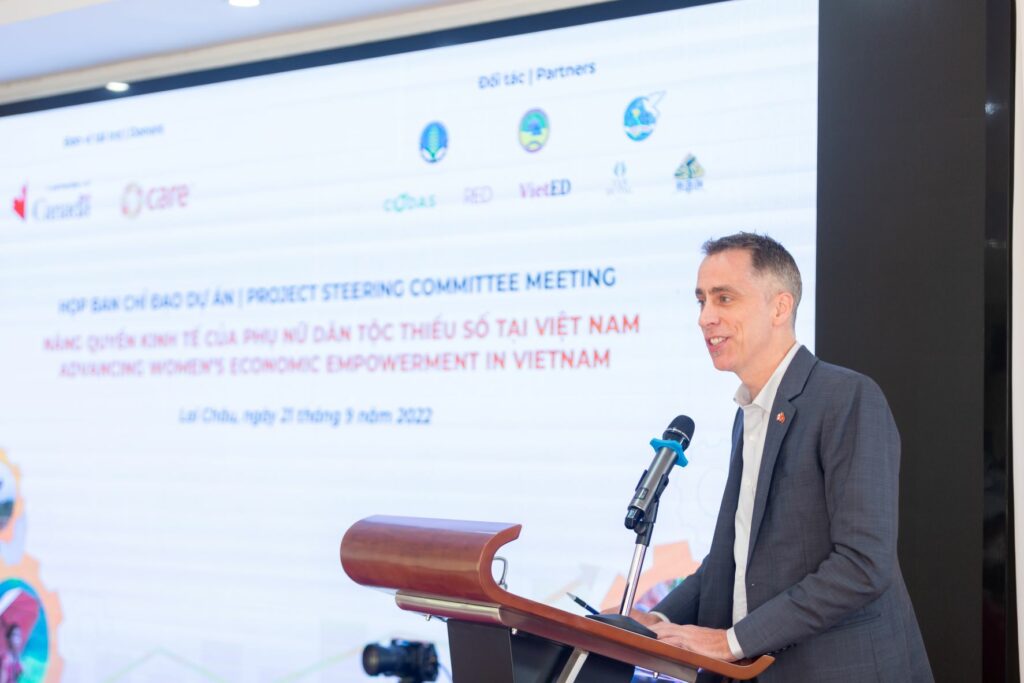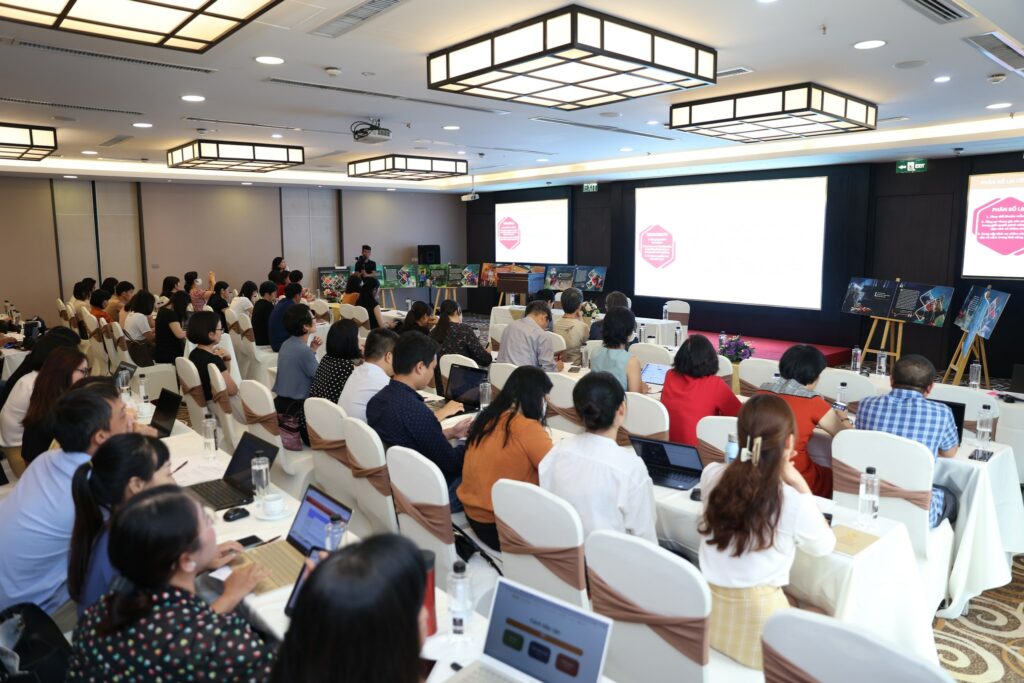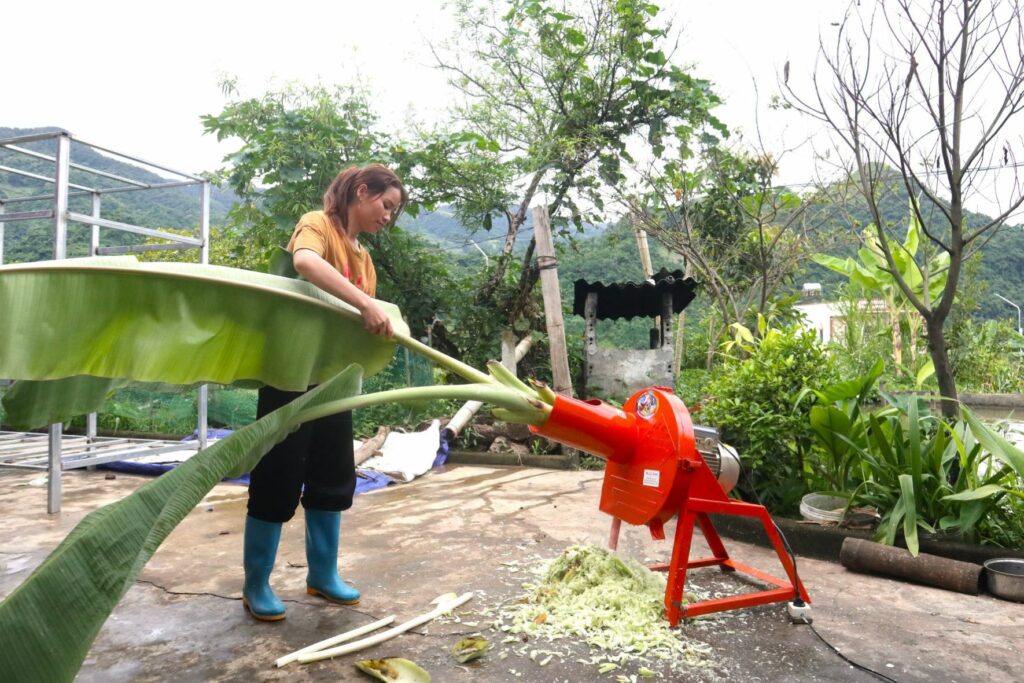On September 21, 2022, CARE International in Vietnam cooperated with the Departments of Agriculture and Rural Development of Lai Chau and Ha Giang provinces to hold the Project Steering Committee of the “Advancing Women’s Economic Empowerment in Vietnam – AWEEV” to summarise the activities in the past time and prepare for the next year of the project.
The meeting was attended by Mr Brian Allemekinders – Head of Cooperation, Embassy of Canada, Ms Le Kim Dung – Country Director of CARE International in Vietnam, Mr Ha Trong Hai – Vice Chairman of Lai Chau Provincial People’s Committee, representatives of relevant departments of the two provinces and partner organisations, together with Canadian bridgeheads, participated in the online form.
The project aims to directly support more than 2,600 ethnic minority women and men and reach 9,000 household members of the above-mentioned community to improve the economic life of poor rural women, especially ethnic minority women. The project will be implemented in 4 years, in 3 communes of Lai Chau province and 6 communes of Ha Giang province with a budget of nearly 4.6 million Canadian dollars.
Speaking at the meeting, Mr Brian Allemekinders affirmed: The AWEEV project aims to promote economic rights, especially for poor rural women and ethnic minority women in Vietnam; and increase women’s participation in paid economic activities. Thereby affirming the important role of women in raising children, economic development, and improving life.

Recognizing the contribution of CARE that has supported people in the province, Vice Chairman of Lai Chau Provincial People’s Committee Ha Trong Hai emphasised, that after receiving the project, the Provincial People’s Committee assigned tasks and directed relevant units to coordinate with CARE International in Vietnam to implement.
During the first year, AWEEV focused on research to better understand unpaid care and domestic work to set specific goals for the project and provide input to intervention measures. The project carried out 7 research studies including baseline, gender and power analysis, unpaid care in ethnic minority communities, gender-responsive infrastructure, environmental sustainability, feasibility of childcare options, and time-saving household appliances assessment.
Supporting the long-term outcome of “Strengthening the promotion of economic rights, especially for poor rural women and ethnic minorities in Vietnam”, the project developed communications and capacity-building strategies for stakeholder groups, specifically:
- The project developed communications strategies for business networks, journalists and media agencies, mass organizations and CSOs.
- Along with the Women’s Union, CARE developed a male champion network, focusing on organizing community events to promote women’s economic rights.
- CARE and the Women’s Union worked with the Departments of Agriculture and Rural Development of the two provinces to develop and implement a capacity-building pathway for a core group of farmers.
- The above two groups would implement a communications campaign strategy to transform gender norms contributing to the unequal caring burden. The strategy was developed by CARE in consultation with local partners.
- The project organized a training course for all project partners and two tea factories. It also consulted with local government officials on project interventions.
- The project also completed an intervention plan for preschools in the project area to increase the number of children attending school and the time children spend in school.
In addition to building an enabling environment for women’s empowerment, the project also strives for the long-term outcome of “Increased participation of poor rural and ethnic minorities women in paid economic activities”. Contributing to this outcome, the project has:
- Established 57 tea groups with nearly 1,400 participants. The groups are also integrated with the Village Savings and Loan Association (VSLA) model.
- Provided partners with 4 training-of-trainers sessions in establishing and operating producer and livelihood groups.
- Identified and supported 7 livelihood options other than tea (3 in Ha Giang, 4 in Lai Chau)
- Supported 71 women with business ideas to join a club to learn about running women-led businesses.

Entering the second year, many of the above strategies and plans have been implemented by the project, among which was a press conference to share results from the unpaid care and domestic work study with the participation of government representatives and policymakers in July 2022. Training sessions, community activities, and gender dialogues… have also been implemented to raise awareness and capacity for target groups.
Recently, in September 2022, the project helped improve the facilities of preschool sites and provided households with time-saving appliances for unpaid care work to households. These supports have had a positive impact on the community, especially women. With children going to school and spending more time in school, the time spent caring for children at home will decrease. Along with that, home appliances have significantly reduced the time spent on unpaid care and domestic work. That reduced time can help women take a break or find income-generating jobs.

After more than a year of implementation, the project has required stakeholders to adjust some content and points of disagreement to better cooperate. This might slow down the implementation of some activities, but the effectiveness will be ensured, helping to achieve the set goals as well as maximize benefits for the community. This was also reaffirmed by Ms Le Kim Dung, Country Director of CARE International in Vietnam in her closing remarks at the Project Steering Committee meeting. She emphasized:
“CARE always listens to the contributions of partners in the implementation process to integrate resources, programs and projects of the Government and localities to promote the operation of the project.”
Ms Le Kim DungCountry Director, CARE International in Vietnam
The “Advancing Women’s Economic Empowerment in Vietnam” project is supported by Global Affairs Canada (GAC) through CARE. AWEEV aims to directly support more than 2,600 ethnic minority women and men and reach 9,000 household members of the above-mentioned community to improve the economic life of poor rural women, especially ethnic minority women. The project will be implemented in 4 years, in 3 communes of Lai Chau province and 6 communes of Ha Giang province with a budget of nearly 4.6 million Canadian dollars.